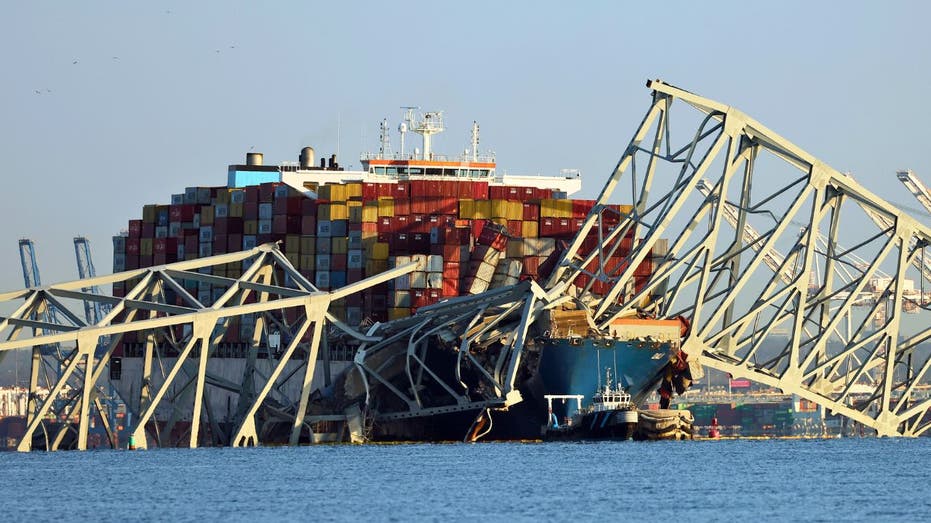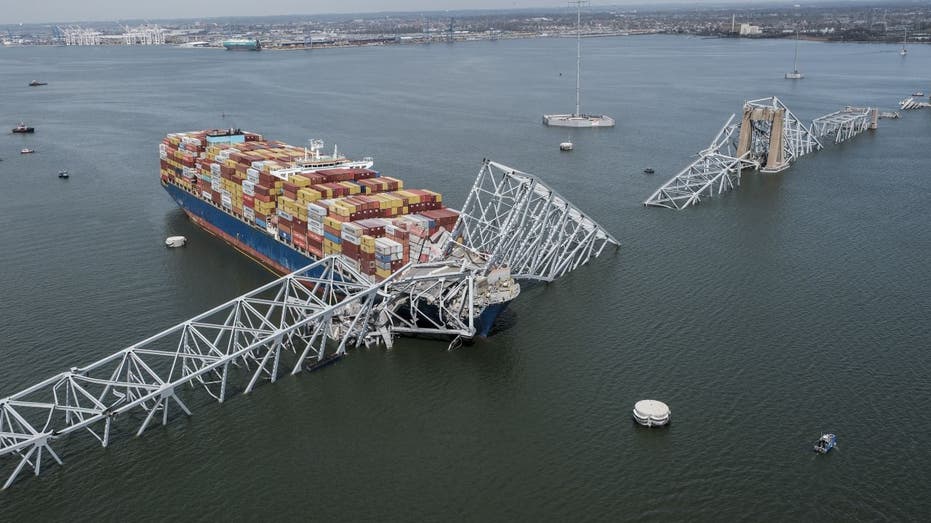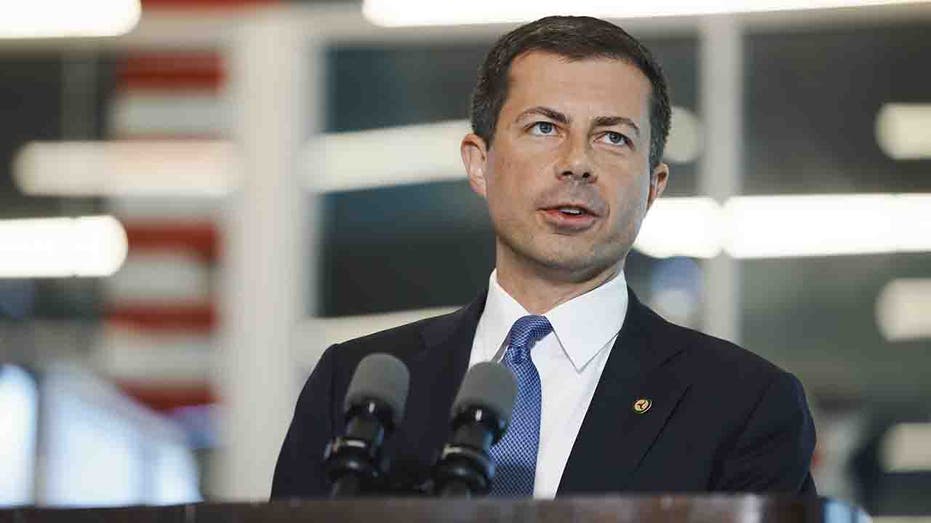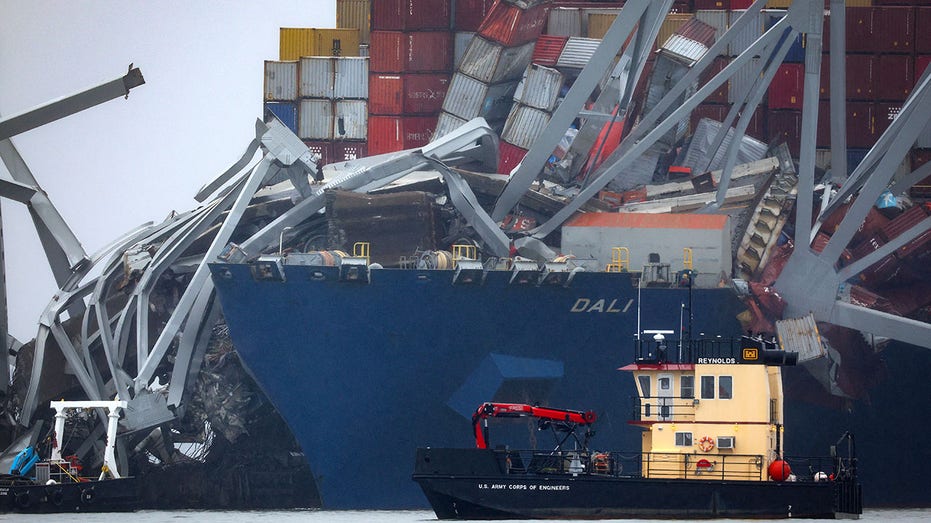Baltimore disaster could see record insurance payouts — but it’s complicated: expert
The largest marine insurance payout of all time is from the Costa Concordia luxury cruise liner disaster in 2012, costing $1.5 billion
Baltimore bridge collapse will have a substantial impact on a number of industries: Louis Campion
Maryland Motor Truck Association President & CEO Louis Campion discusses the impact of the Francis Scott Key Bridge collapse on truck and shipping routes on The Bottom Line.
The total insurance payouts that will come as a result of the Francis Scott Key Bridge collapsing in Baltimore will likely run into billions of dollars and could end up being the largest marine insurance payout of all time – topping the Costa Concordia luxury cruise liner disaster in 2012 that saw $1.5 billion being paid out.
The insurance claims process is expected to be complicated, with various parties involved, and determining who bears responsibility will be a key factor in deciding who gets paid what.
Eight construction workers, all of whom were from Central America, plummeted into the water after the Dali, a Singaporean-flagged container ship, slammed into the bridge, causing it to collapse. Two were rescued after the collapse. Divers have recovered the bodies of two others, and the other four are presumed dead.
COULD PROTECTIVE BARRIERS HAVE PREVENTED BALTIMORE BRIDGE COLLAPSE?

The Francis Scott Key Bridge and the Dali cargo vessel pictured on March 29, 2023. (Kevin Dietsch/Getty Images / Getty Images)
Those deaths and injuries will form one avenue of insurance claims, while the collapse itself – including the rebuilding of the bridge and the financial knock-on effect of its destruction – will form another multi-layered path of claims, an expert says.
The port, which has been closed due to the deadly incident, is the busiest in the U.S. for car shipments, handling more than 750,000 vehicles in 2023, according to data from the Maryland Port Administration. It is also the largest U.S. port by volume for handling farm and construction machinery, as well as agricultural products.
It handled a record amount of cargo last year, making it the 20th biggest port in the nation, ranked by total tons, according to the Bureau of Transportation Statistics.
Around 30,000 vehicles used to pass over the bridge daily, Transportation Secretary Pete Buttigieg told "America’s Newsroom" on Wednesday, and its closure is impacting vehicular traffic and trucking since the I-695 that once ran across it, links Washington, Baltimore, Philadelphia and New York.
Morningstar DBRS, a global credit rating agency, says the tragedy could lead to up to $4 billion in insurance claims, nearly three times higher than the Concordia disaster.
Adrian Azer, of the Washington D.C.-based law firm Haynes and Boone, tells Fox News Business that payout for the Baltimore tragedy could easily match that of the Concordia and that there are various factors and issues that will have to be ironed out.
"It is really unclear at this point if it will match the Concordia, it certainly could be more, but it’s probably too early to estimate an amount," Azer says. "There are lots of buckets of insurance that may come into play. Resolution of the insurance is going to take years. It is a long process. It's going to be a question of division of liability for not only the property damage ... but for the bodily injury [of the victims]."
BALTIMORE BRIDGE COLLAPSE: ECONOMISTS PREDICT INFLATION 'PINCH' FOR AMERICAN CONSUMERS

The remains of the Francis Scott Key Bridge on March 26, 2024, in Baltimore, Maryland. (Michael A. McCoy for The Washington Post via Getty Images / Getty Images)
"You're going to have arguments from the construction company that they're not actually liable for the deaths, because it wasn't their fault. The boat hit, and they didn't really cause the injury," Azer adds.
Azer says that many shipping companies pool their insurance through P&I Clubs, a group structure that shares its loss exposure. P&I Clubs represent around 90% of the world's oceangoing tonnage, covering virtually every type of vessel, according to its website. Its members mutually reinsure each other by sharing claims above $10 million. Fox News reached out to P&I Clubs for comment on whether Dali was part of the group, but did not immediately receive a response.
The International Group of P&I Clubs collectively insures approximately 90% of the world's ocean-going tonnage. The IG Group declined to comment.
"What is also interesting, too, is that President Biden came out and said there's going to be government funding to rebuild the bridge," Azer says. "That’s another complicating factor, and so that's going to be an argument that's being presented that people are going to have to debate. Well, if the government is going to pay a bill to rebuild this, then do you really need insurance, right? I would argue that if there are insurance companies there, then they would have to contribute their amount, but that will have to play out in the court systems."

Transportation Secretary Pete Buttigieg has said that those who are deemed responsible for the tragedy will still have to be made financially liable. (Taylor Glascock/Bloomberg via Getty Images / Getty Images)
Buttigieg said that while the government is going to help with funding, those who are deemed responsible for the tragedy will still have to be made financially liable.
"There's no question that if the investigation determines that any private party or parties are responsible, they will be held accountable. But that can't be something that we're just waiting around for," Buttigieg said Wednesday. "We've got to make sure that we work now, today, to get this bridge back up and to get this port back open."
Azer, who has represented clients in high-profile insurance cases such as sex abuse claims against the Boy Scouts of America, says that the outcome of the investigation will be crucial in determining who owes what.
"The insurer is going to be looking at this, asking if there is some form of third party that they can shift the liability to, and so part of the investigative process will be determining the cause," Azer says. "Was it a faulty machining part, was it a fuel issue, was there some other some third party that was responsible? There will be a lot of jockeying back and forth about whose problem this really is and who is the party that’s going to pay the dollars."
Azer also noted that lawsuits can be initiated even before the National Transportation Safety Board (NTSB) investigation makes a determination on causation.
"The families can go out and sue tomorrow, and those companies they sue have to respond to the complaint," Azer says. "So in some ways, the NTSB investigation is not a bar to pursuing any claims, but the investigation certainly will shed light and provide guidance on who is the responsible party."

A U.S. Army Corps of Engineers boat passes the wreckage of the Dali cargo ship on Wednesday, March 27. (Reuters/Mike Segar / Reuters Photos)
Azer says that the families could sue multiple parties, depending on who they argue is potentially responsible.
"It's going to be enormously complicated where people are pursuing their rights, and then you're going to have companies that are going to be fighting about responsibilities, which will in turn cause insurance companies to fight about responsibility," Azer says. "So not only do you have a primary dispute between claimants and potentially responsible parties, but within those responsible parties, you're going to have disagreements about who's actually responsible and who bears the lion's share of liability."
CLICK HERE TO READ MORE ON FOX BUSINESS
He says that parties usually end up settling before claims are brought to court.
"Our judicial system, for the most part, results in settlements not trials," Azer says. "To the extent there are trials or rulings or judgments that are negative, then they could go through the entire appellate process, which takes years and years."
Fox News’ Bradford Benz and Reuters contributed to this report.

